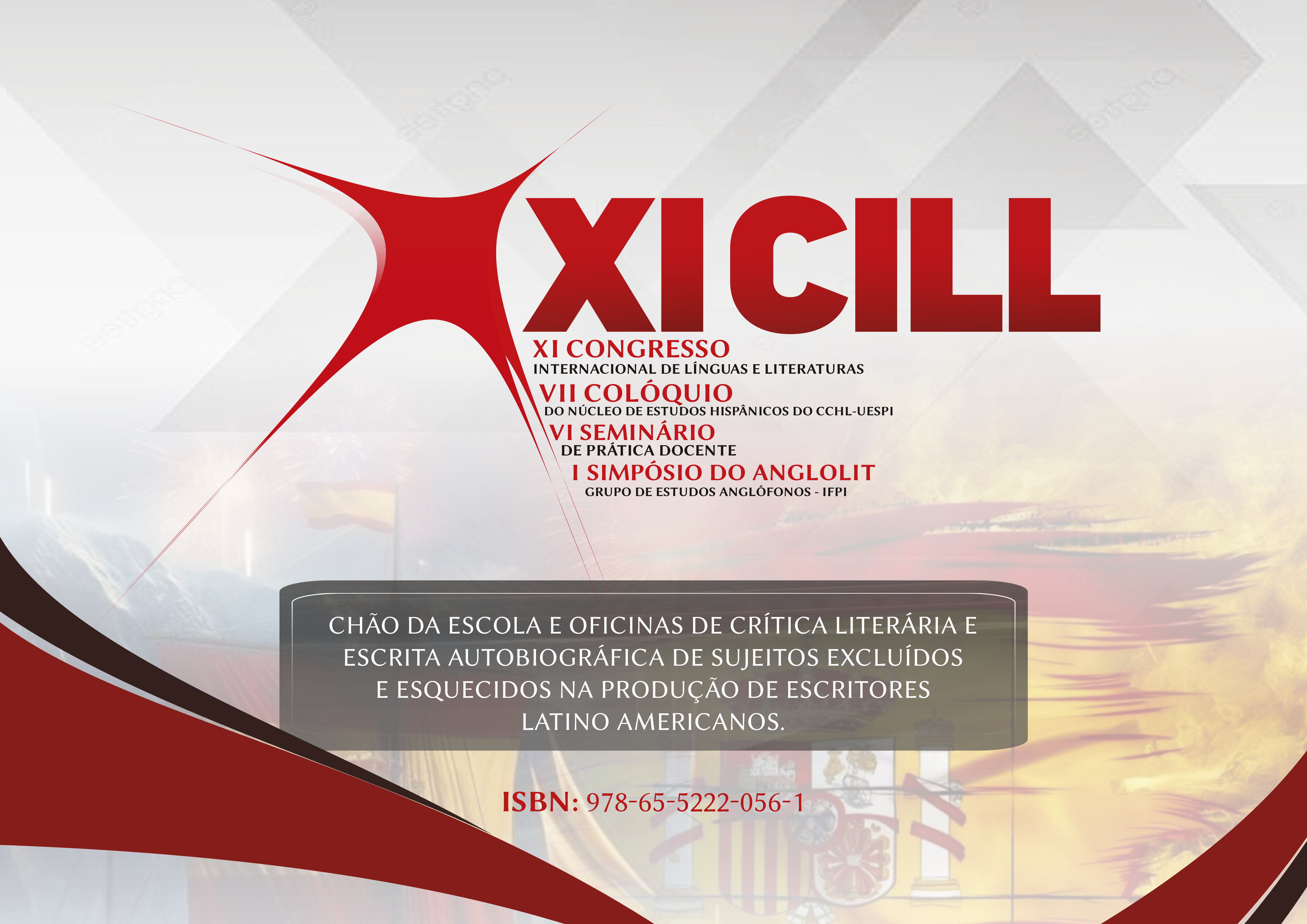A READER-RESPONSE ANALYSIS OF THE DIALECTAL EXTRAPOLATION IN PAUL KINGSNORTH’S THE WAKE (2014)
"2025-09-15" // app/Providers/../Base/Publico/Artigo/resources/show_includes/info_artigo.blade.php
App\Base\Administrativo\Model\Artigo {#1845 // app/Providers/../Base/Publico/Artigo/resources/show_includes/info_artigo.blade.php #connection: "mysql" +table: "artigo" #primaryKey: "id" #keyType: "int" +incrementing: true #with: [] #withCount: [] +preventsLazyLoading: false #perPage: 15 +exists: true +wasRecentlyCreated: false #escapeWhenCastingToString: false #attributes: array:35 [ "id" => 123199 "edicao_id" => 429 "trabalho_id" => 147 "inscrito_id" => 31 "titulo" => "A READER-RESPONSE ANALYSIS OF THE DIALECTAL EXTRAPOLATION IN PAUL KINGSNORTH’S THE WAKE (2014)" "resumo" => "The Wake (2014) by Paul Kingsnorth is a work of historical/alternate-history fiction that is entirely written in a dialectal extrapolation of English (Stockwell 2006). Scholarship on the novel – Thier (2016), Czarnowus (2018), and Traxel (2022) – has primarily focused on this fictional dialect, intradiegetically called anglisc but elsewhere referred to as shadow tongue, criticising it for not achieving its authorial intentions. This seems to derive from subjective impressions that deem the text’s limited readability as an obstacle to reader engagement. What is more, anglisc has frequently been framed as linguistically inauthentic and historically inaccurate. Notwithstanding the common assumption that literary dialects typically block engagement, the available data on the reception of the novel appear to point in the opposite direction. Accordingly, this paper presents the preliminary findings of a survey of the section ‘reader’s reviews’ on Goodreads.com, using a reader-response approach framed within literary stylistics that presents a data-backed analysis of the fictional dialect’s narrative functions (Noletto 2024; Harvey 2025). The paper concludes by providing a new angle to the novel’s prose that sets out anglisc’s artistry, aesthetics, and readerly effects." "modalidade" => "Comunicação Oral (CO)" "area_tematica" => "ST 05 - EXPLORING THE LANGUAGE OF SPECULATIVE FICTION" "palavra_chave" => ", , , , " "idioma" => "Português" "arquivo" => "TRABALHO__EV228_ID31_TB147_15072025215218.pdf" "created_at" => "2025-09-05 10:38:33" "updated_at" => null "ativo" => 1 "autor_nome" => "ISRAEL ALVES CORREA NOLETTO" "autor_nome_curto" => "Israel A C Noletto" "autor_email" => "israelnoletto@ifpi.edu.br" "autor_ies" => "INSTITUTO FEDERAL DE EDUCAÇÃO, CIÊNCIA E TECNOLOGIA DO PIAUÍ (IFPI)" "autor_imagem" => "" "edicao_url" => "anais-do-xi-congresso-internacional-de-linguas-e-literatura" "edicao_nome" => "Anais do XI Congresso Internacional de Línguas e Literatura" "edicao_evento" => """ XI CONGRESSO INTERNACIONAL DE LÍNGUAS E LITERATURAS \r\n XI CONGRESSO INTERNACIONAL DE LÍNGUAS E LITERATURAS / VII COLÓQUIO DO NÚCLEO DE ESTUDOS HISPÂNICOS DO CCHL-UESPI / VI SEMINÁRIO DE PRÁTICA DOCENTE / I SIMPÓSIO DO ANGLOLIT """ "edicao_ano" => 2025 "edicao_pasta" => "anais/linguas/2025" "edicao_logo" => null "edicao_capa" => "68c8502a1c10e_15092025144306.png" "data_publicacao" => "2025-09-15" "edicao_publicada_em" => "2025-09-03 09:22:34" "publicacao_id" => 81 "publicacao_nome" => "Revista do Congresso Internacional de Linguas e Literatura" "publicacao_codigo" => "978-65-86901-40-5" "tipo_codigo_id" => 2 "tipo_codigo_nome" => "ISBN" "tipo_publicacao_id" => 1 "tipo_publicacao_nome" => "ANAIS de Evento" ] #original: array:35 [ "id" => 123199 "edicao_id" => 429 "trabalho_id" => 147 "inscrito_id" => 31 "titulo" => "A READER-RESPONSE ANALYSIS OF THE DIALECTAL EXTRAPOLATION IN PAUL KINGSNORTH’S THE WAKE (2014)" "resumo" => "The Wake (2014) by Paul Kingsnorth is a work of historical/alternate-history fiction that is entirely written in a dialectal extrapolation of English (Stockwell 2006). Scholarship on the novel – Thier (2016), Czarnowus (2018), and Traxel (2022) – has primarily focused on this fictional dialect, intradiegetically called anglisc but elsewhere referred to as shadow tongue, criticising it for not achieving its authorial intentions. This seems to derive from subjective impressions that deem the text’s limited readability as an obstacle to reader engagement. What is more, anglisc has frequently been framed as linguistically inauthentic and historically inaccurate. Notwithstanding the common assumption that literary dialects typically block engagement, the available data on the reception of the novel appear to point in the opposite direction. Accordingly, this paper presents the preliminary findings of a survey of the section ‘reader’s reviews’ on Goodreads.com, using a reader-response approach framed within literary stylistics that presents a data-backed analysis of the fictional dialect’s narrative functions (Noletto 2024; Harvey 2025). The paper concludes by providing a new angle to the novel’s prose that sets out anglisc’s artistry, aesthetics, and readerly effects." "modalidade" => "Comunicação Oral (CO)" "area_tematica" => "ST 05 - EXPLORING THE LANGUAGE OF SPECULATIVE FICTION" "palavra_chave" => ", , , , " "idioma" => "Português" "arquivo" => "TRABALHO__EV228_ID31_TB147_15072025215218.pdf" "created_at" => "2025-09-05 10:38:33" "updated_at" => null "ativo" => 1 "autor_nome" => "ISRAEL ALVES CORREA NOLETTO" "autor_nome_curto" => "Israel A C Noletto" "autor_email" => "israelnoletto@ifpi.edu.br" "autor_ies" => "INSTITUTO FEDERAL DE EDUCAÇÃO, CIÊNCIA E TECNOLOGIA DO PIAUÍ (IFPI)" "autor_imagem" => "" "edicao_url" => "anais-do-xi-congresso-internacional-de-linguas-e-literatura" "edicao_nome" => "Anais do XI Congresso Internacional de Línguas e Literatura" "edicao_evento" => """ XI CONGRESSO INTERNACIONAL DE LÍNGUAS E LITERATURAS \r\n XI CONGRESSO INTERNACIONAL DE LÍNGUAS E LITERATURAS / VII COLÓQUIO DO NÚCLEO DE ESTUDOS HISPÂNICOS DO CCHL-UESPI / VI SEMINÁRIO DE PRÁTICA DOCENTE / I SIMPÓSIO DO ANGLOLIT """ "edicao_ano" => 2025 "edicao_pasta" => "anais/linguas/2025" "edicao_logo" => null "edicao_capa" => "68c8502a1c10e_15092025144306.png" "data_publicacao" => "2025-09-15" "edicao_publicada_em" => "2025-09-03 09:22:34" "publicacao_id" => 81 "publicacao_nome" => "Revista do Congresso Internacional de Linguas e Literatura" "publicacao_codigo" => "978-65-86901-40-5" "tipo_codigo_id" => 2 "tipo_codigo_nome" => "ISBN" "tipo_publicacao_id" => 1 "tipo_publicacao_nome" => "ANAIS de Evento" ] #changes: [] #casts: array:14 [ "id" => "integer" "edicao_id" => "integer" "trabalho_id" => "integer" "inscrito_id" => "integer" "titulo" => "string" "resumo" => "string" "modalidade" => "string" "area_tematica" => "string" "palavra_chave" => "string" "idioma" => "string" "arquivo" => "string" "created_at" => "datetime" "updated_at" => "datetime" "ativo" => "boolean" ] #classCastCache: [] #attributeCastCache: [] #dates: [] #dateFormat: null #appends: [] #dispatchesEvents: [] #observables: [] #relations: [] #touches: [] +timestamps: false #hidden: [] #visible: [] +fillable: array:13 [ 0 => "edicao_id" 1 => "trabalho_id" 2 => "inscrito_id" 3 => "titulo" 4 => "resumo" 5 => "modalidade" 6 => "area_tematica" 7 => "palavra_chave" 8 => "idioma" 9 => "arquivo" 10 => "created_at" 11 => "updated_at" 12 => "ativo" ] #guarded: array:1 [ 0 => "*" ] }



